Legal and Ethical Considerations: Dead People Online and Privacy
VerifiedAdded on 2020/10/05
|8
|1968
|122
Report
AI Summary
This report explores the complex intersection of ethics, law, and technology concerning the online presence of deceased individuals. It delves into the critical issues surrounding digital legacies, the right to be forgotten, and the privacy of personal data after death. The report examines the current legal models and frameworks, including contract law and property law, used to address these issues, highlighting their limitations and proposing potential solutions. It discusses the role of social media platforms, such as Facebook, in managing user accounts after death, including legacy contacts and memorialization options. The report further analyzes the concept of digital legacies, encompassing passwords, online bank accounts, email addresses, social media profiles, and digital assets like photos and music, and emphasizes the importance of planning for the management of these assets. The report also covers legal developments in different countries, including the United States and France, and the adoption of tools such as Google's inactive account manager tool and the digital republic act 2016 to address post-mortem digital asset management. The report concludes by emphasizing the need for further legal clarification and the importance of protecting the privacy and dignity of deceased individuals in the digital age.

The Ethics of Dead People Online
and the Right to Be Forgotten
and the Right to Be Forgotten
Paraphrase This Document
Need a fresh take? Get an instant paraphrase of this document with our AI Paraphraser
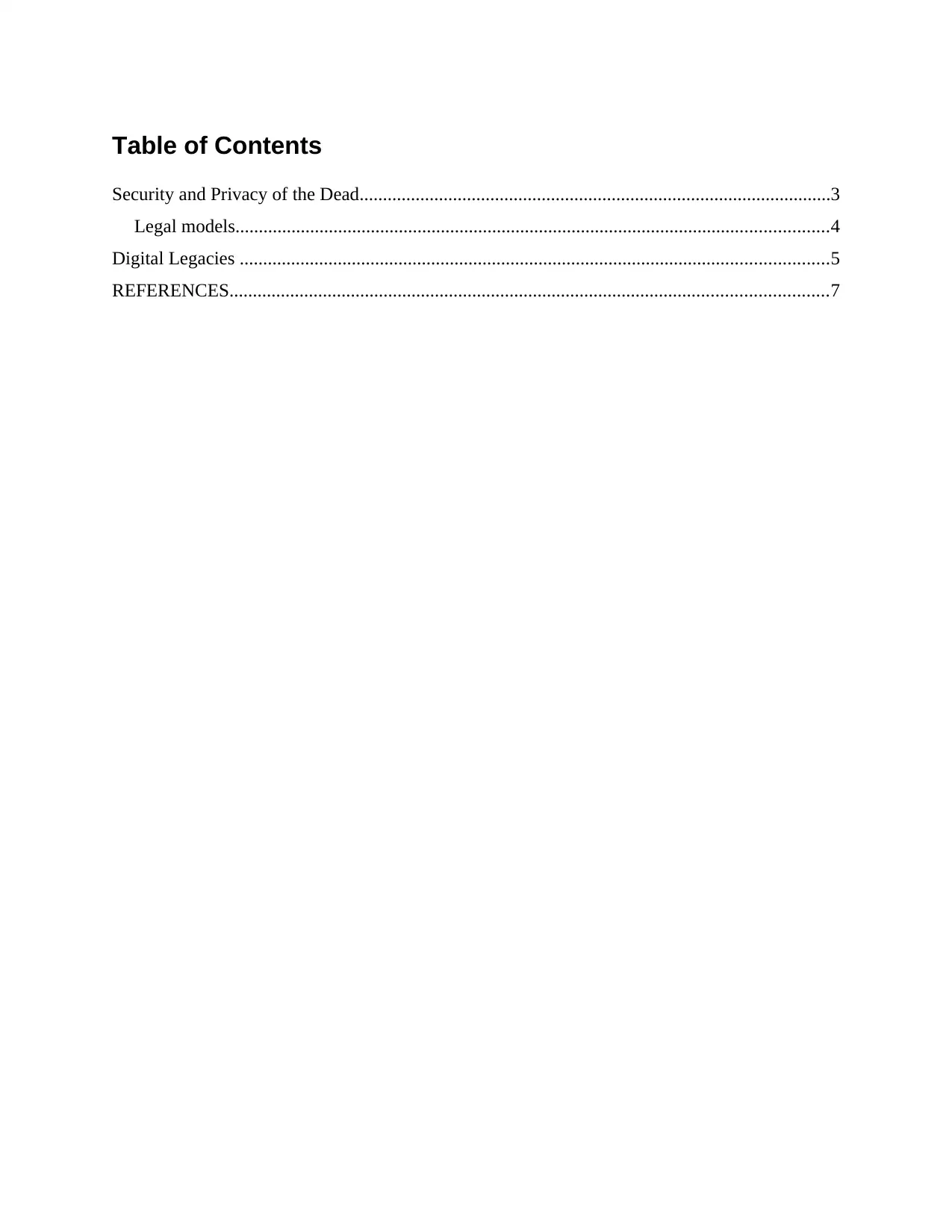
Table of Contents
Security and Privacy of the Dead.....................................................................................................3
Legal models...............................................................................................................................4
Digital Legacies ..............................................................................................................................5
REFERENCES................................................................................................................................7
Security and Privacy of the Dead.....................................................................................................3
Legal models...............................................................................................................................4
Digital Legacies ..............................................................................................................................5
REFERENCES................................................................................................................................7
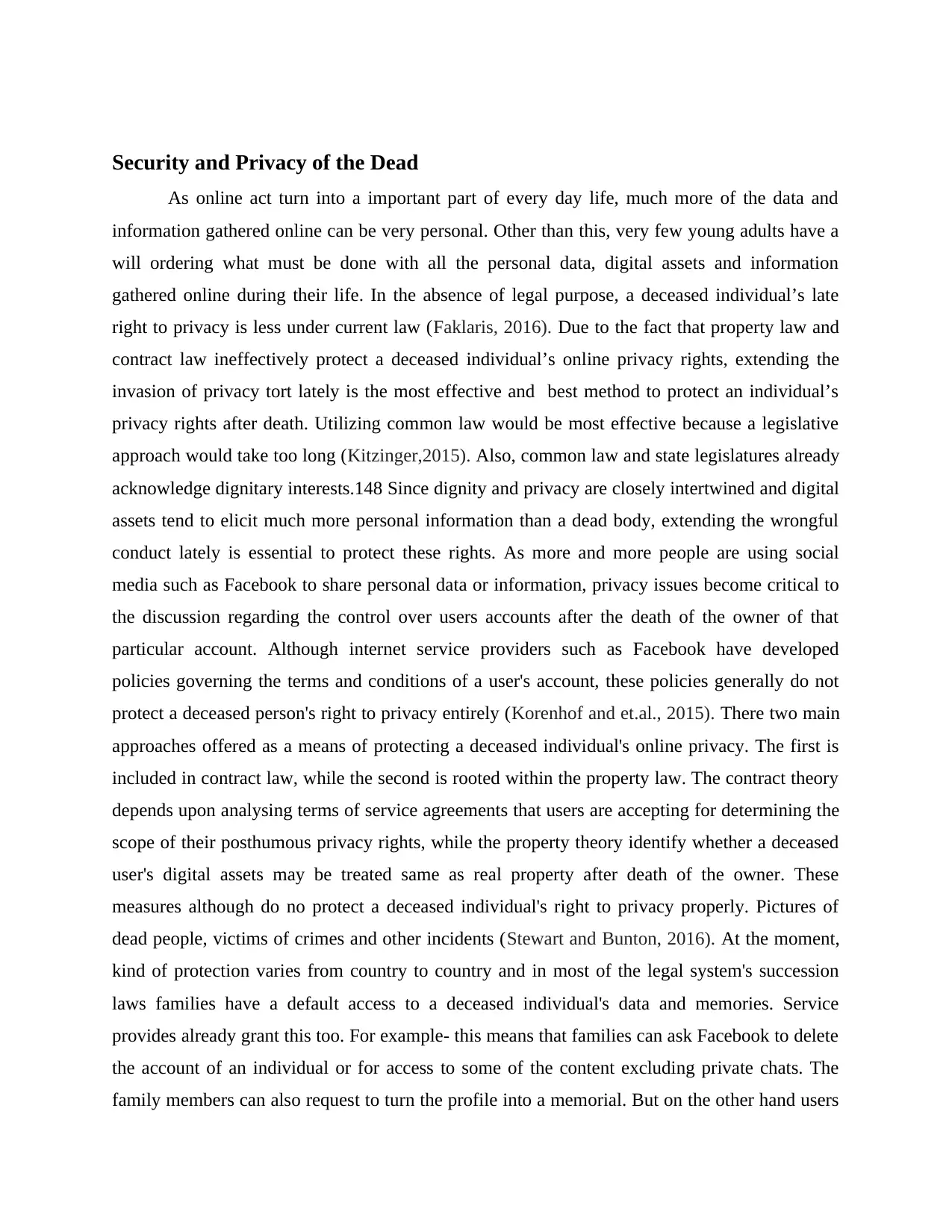
Security and Privacy of the Dead
As online act turn into a important part of every day life, much more of the data and
information gathered online can be very personal. Other than this, very few young adults have a
will ordering what must be done with all the personal data, digital assets and information
gathered online during their life. In the absence of legal purpose, a deceased individual’s late
right to privacy is less under current law (Faklaris, 2016). Due to the fact that property law and
contract law ineffectively protect a deceased individual’s online privacy rights, extending the
invasion of privacy tort lately is the most effective and best method to protect an individual’s
privacy rights after death. Utilizing common law would be most effective because a legislative
approach would take too long (Kitzinger,2015). Also, common law and state legislatures already
acknowledge dignitary interests.148 Since dignity and privacy are closely intertwined and digital
assets tend to elicit much more personal information than a dead body, extending the wrongful
conduct lately is essential to protect these rights. As more and more people are using social
media such as Facebook to share personal data or information, privacy issues become critical to
the discussion regarding the control over users accounts after the death of the owner of that
particular account. Although internet service providers such as Facebook have developed
policies governing the terms and conditions of a user's account, these policies generally do not
protect a deceased person's right to privacy entirely (Korenhof and et.al., 2015). There two main
approaches offered as a means of protecting a deceased individual's online privacy. The first is
included in contract law, while the second is rooted within the property law. The contract theory
depends upon analysing terms of service agreements that users are accepting for determining the
scope of their posthumous privacy rights, while the property theory identify whether a deceased
user's digital assets may be treated same as real property after death of the owner. These
measures although do no protect a deceased individual's right to privacy properly. Pictures of
dead people, victims of crimes and other incidents (Stewart and Bunton, 2016). At the moment,
kind of protection varies from country to country and in most of the legal system's succession
laws families have a default access to a deceased individual's data and memories. Service
provides already grant this too. For example- this means that families can ask Facebook to delete
the account of an individual or for access to some of the content excluding private chats. The
family members can also request to turn the profile into a memorial. But on the other hand users
As online act turn into a important part of every day life, much more of the data and
information gathered online can be very personal. Other than this, very few young adults have a
will ordering what must be done with all the personal data, digital assets and information
gathered online during their life. In the absence of legal purpose, a deceased individual’s late
right to privacy is less under current law (Faklaris, 2016). Due to the fact that property law and
contract law ineffectively protect a deceased individual’s online privacy rights, extending the
invasion of privacy tort lately is the most effective and best method to protect an individual’s
privacy rights after death. Utilizing common law would be most effective because a legislative
approach would take too long (Kitzinger,2015). Also, common law and state legislatures already
acknowledge dignitary interests.148 Since dignity and privacy are closely intertwined and digital
assets tend to elicit much more personal information than a dead body, extending the wrongful
conduct lately is essential to protect these rights. As more and more people are using social
media such as Facebook to share personal data or information, privacy issues become critical to
the discussion regarding the control over users accounts after the death of the owner of that
particular account. Although internet service providers such as Facebook have developed
policies governing the terms and conditions of a user's account, these policies generally do not
protect a deceased person's right to privacy entirely (Korenhof and et.al., 2015). There two main
approaches offered as a means of protecting a deceased individual's online privacy. The first is
included in contract law, while the second is rooted within the property law. The contract theory
depends upon analysing terms of service agreements that users are accepting for determining the
scope of their posthumous privacy rights, while the property theory identify whether a deceased
user's digital assets may be treated same as real property after death of the owner. These
measures although do no protect a deceased individual's right to privacy properly. Pictures of
dead people, victims of crimes and other incidents (Stewart and Bunton, 2016). At the moment,
kind of protection varies from country to country and in most of the legal system's succession
laws families have a default access to a deceased individual's data and memories. Service
provides already grant this too. For example- this means that families can ask Facebook to delete
the account of an individual or for access to some of the content excluding private chats. The
family members can also request to turn the profile into a memorial. But on the other hand users
⊘ This is a preview!⊘
Do you want full access?
Subscribe today to unlock all pages.

Trusted by 1+ million students worldwide
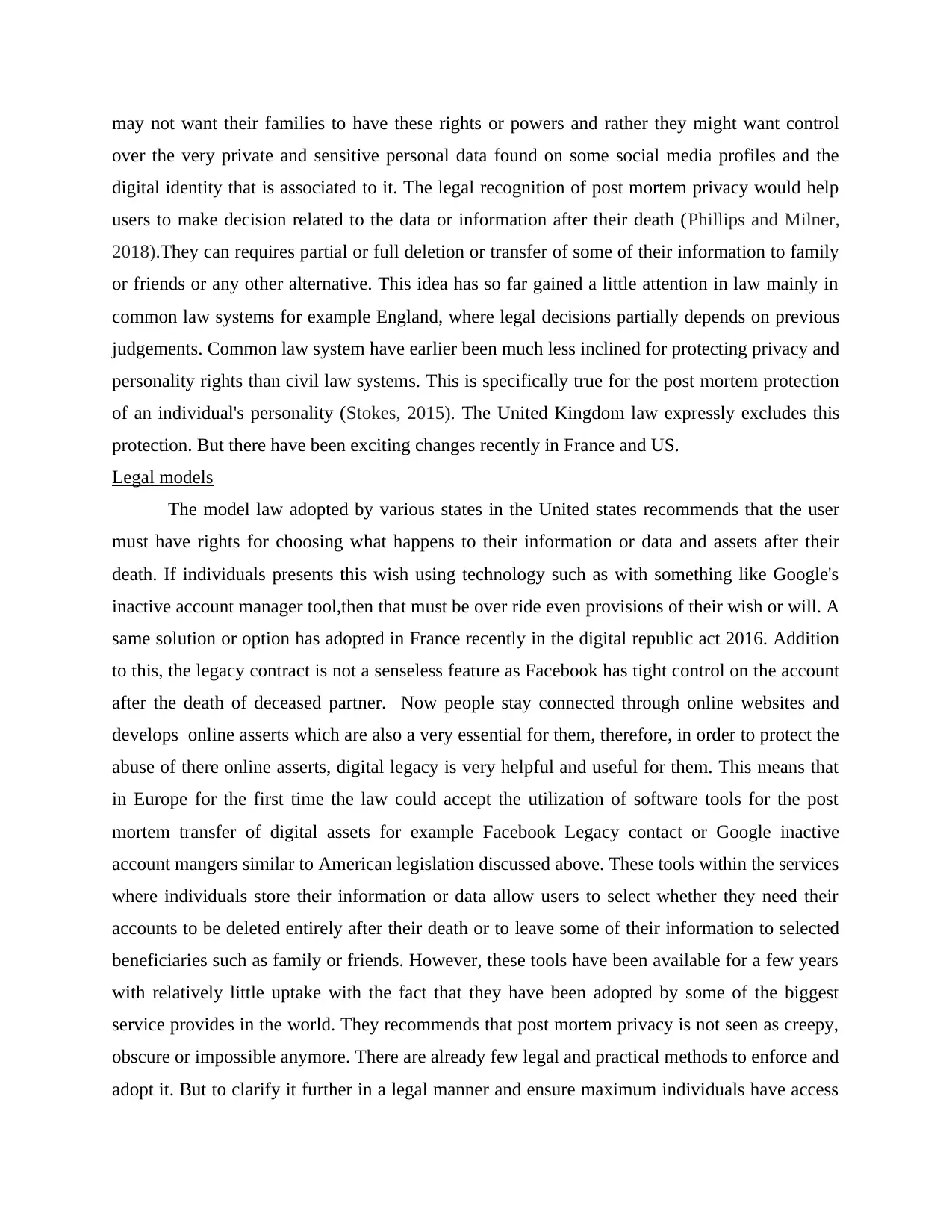
may not want their families to have these rights or powers and rather they might want control
over the very private and sensitive personal data found on some social media profiles and the
digital identity that is associated to it. The legal recognition of post mortem privacy would help
users to make decision related to the data or information after their death (Phillips and Milner,
2018).They can requires partial or full deletion or transfer of some of their information to family
or friends or any other alternative. This idea has so far gained a little attention in law mainly in
common law systems for example England, where legal decisions partially depends on previous
judgements. Common law system have earlier been much less inclined for protecting privacy and
personality rights than civil law systems. This is specifically true for the post mortem protection
of an individual's personality (Stokes, 2015). The United Kingdom law expressly excludes this
protection. But there have been exciting changes recently in France and US.
Legal models
The model law adopted by various states in the United states recommends that the user
must have rights for choosing what happens to their information or data and assets after their
death. If individuals presents this wish using technology such as with something like Google's
inactive account manager tool,then that must be over ride even provisions of their wish or will. A
same solution or option has adopted in France recently in the digital republic act 2016. Addition
to this, the legacy contract is not a senseless feature as Facebook has tight control on the account
after the death of deceased partner. Now people stay connected through online websites and
develops online asserts which are also a very essential for them, therefore, in order to protect the
abuse of there online asserts, digital legacy is very helpful and useful for them. This means that
in Europe for the first time the law could accept the utilization of software tools for the post
mortem transfer of digital assets for example Facebook Legacy contact or Google inactive
account mangers similar to American legislation discussed above. These tools within the services
where individuals store their information or data allow users to select whether they need their
accounts to be deleted entirely after their death or to leave some of their information to selected
beneficiaries such as family or friends. However, these tools have been available for a few years
with relatively little uptake with the fact that they have been adopted by some of the biggest
service provides in the world. They recommends that post mortem privacy is not seen as creepy,
obscure or impossible anymore. There are already few legal and practical methods to enforce and
adopt it. But to clarify it further in a legal manner and ensure maximum individuals have access
over the very private and sensitive personal data found on some social media profiles and the
digital identity that is associated to it. The legal recognition of post mortem privacy would help
users to make decision related to the data or information after their death (Phillips and Milner,
2018).They can requires partial or full deletion or transfer of some of their information to family
or friends or any other alternative. This idea has so far gained a little attention in law mainly in
common law systems for example England, where legal decisions partially depends on previous
judgements. Common law system have earlier been much less inclined for protecting privacy and
personality rights than civil law systems. This is specifically true for the post mortem protection
of an individual's personality (Stokes, 2015). The United Kingdom law expressly excludes this
protection. But there have been exciting changes recently in France and US.
Legal models
The model law adopted by various states in the United states recommends that the user
must have rights for choosing what happens to their information or data and assets after their
death. If individuals presents this wish using technology such as with something like Google's
inactive account manager tool,then that must be over ride even provisions of their wish or will. A
same solution or option has adopted in France recently in the digital republic act 2016. Addition
to this, the legacy contract is not a senseless feature as Facebook has tight control on the account
after the death of deceased partner. Now people stay connected through online websites and
develops online asserts which are also a very essential for them, therefore, in order to protect the
abuse of there online asserts, digital legacy is very helpful and useful for them. This means that
in Europe for the first time the law could accept the utilization of software tools for the post
mortem transfer of digital assets for example Facebook Legacy contact or Google inactive
account mangers similar to American legislation discussed above. These tools within the services
where individuals store their information or data allow users to select whether they need their
accounts to be deleted entirely after their death or to leave some of their information to selected
beneficiaries such as family or friends. However, these tools have been available for a few years
with relatively little uptake with the fact that they have been adopted by some of the biggest
service provides in the world. They recommends that post mortem privacy is not seen as creepy,
obscure or impossible anymore. There are already few legal and practical methods to enforce and
adopt it. But to clarify it further in a legal manner and ensure maximum individuals have access
Paraphrase This Document
Need a fresh take? Get an instant paraphrase of this document with our AI Paraphraser
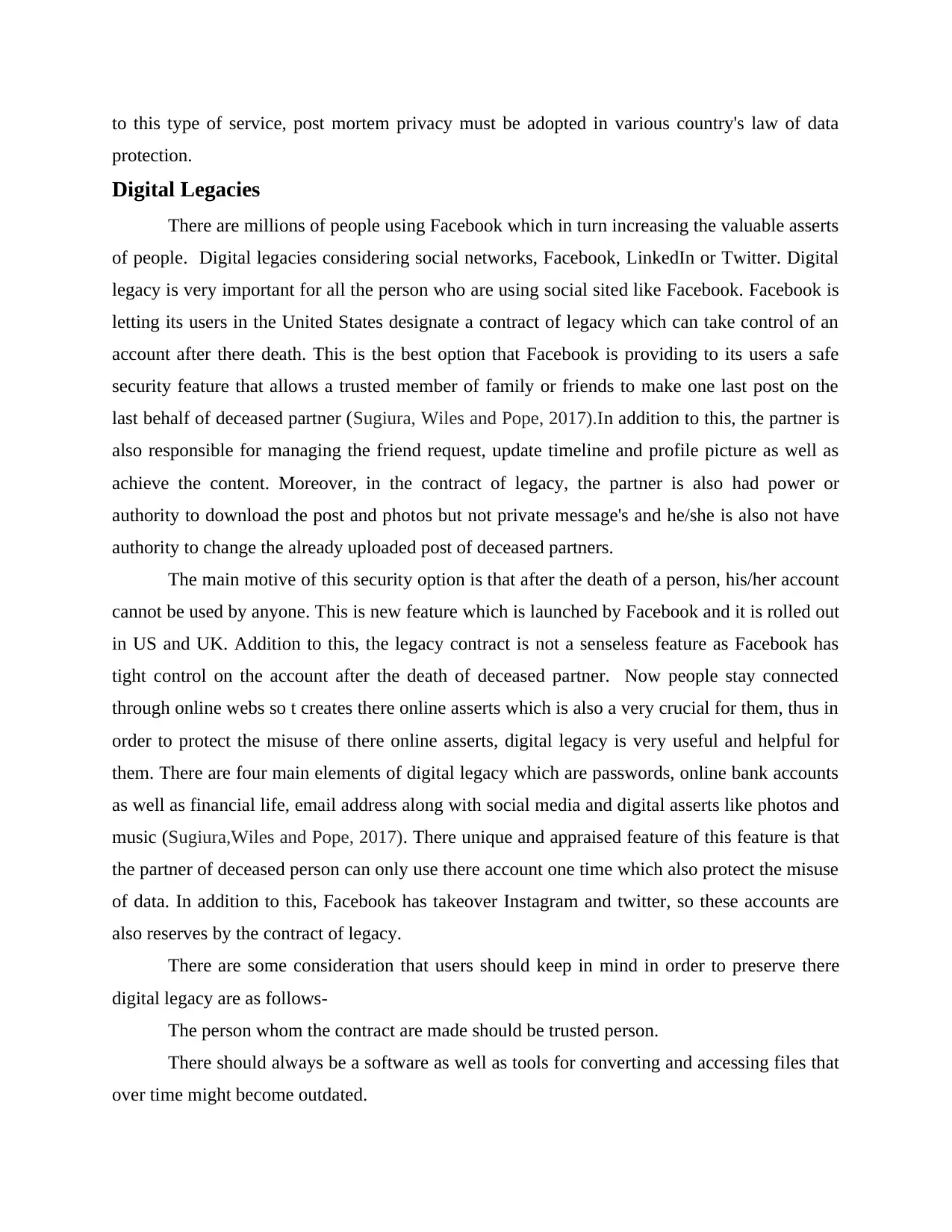
to this type of service, post mortem privacy must be adopted in various country's law of data
protection.
Digital Legacies
There are millions of people using Facebook which in turn increasing the valuable asserts
of people. Digital legacies considering social networks, Facebook, LinkedIn or Twitter. Digital
legacy is very important for all the person who are using social sited like Facebook. Facebook is
letting its users in the United States designate a contract of legacy which can take control of an
account after there death. This is the best option that Facebook is providing to its users a safe
security feature that allows a trusted member of family or friends to make one last post on the
last behalf of deceased partner (Sugiura, Wiles and Pope, 2017).In addition to this, the partner is
also responsible for managing the friend request, update timeline and profile picture as well as
achieve the content. Moreover, in the contract of legacy, the partner is also had power or
authority to download the post and photos but not private message's and he/she is also not have
authority to change the already uploaded post of deceased partners.
The main motive of this security option is that after the death of a person, his/her account
cannot be used by anyone. This is new feature which is launched by Facebook and it is rolled out
in US and UK. Addition to this, the legacy contract is not a senseless feature as Facebook has
tight control on the account after the death of deceased partner. Now people stay connected
through online webs so t creates there online asserts which is also a very crucial for them, thus in
order to protect the misuse of there online asserts, digital legacy is very useful and helpful for
them. There are four main elements of digital legacy which are passwords, online bank accounts
as well as financial life, email address along with social media and digital asserts like photos and
music (Sugiura,Wiles and Pope, 2017). There unique and appraised feature of this feature is that
the partner of deceased person can only use there account one time which also protect the misuse
of data. In addition to this, Facebook has takeover Instagram and twitter, so these accounts are
also reserves by the contract of legacy.
There are some consideration that users should keep in mind in order to preserve there
digital legacy are as follows-
The person whom the contract are made should be trusted person.
There should always be a software as well as tools for converting and accessing files that
over time might become outdated.
protection.
Digital Legacies
There are millions of people using Facebook which in turn increasing the valuable asserts
of people. Digital legacies considering social networks, Facebook, LinkedIn or Twitter. Digital
legacy is very important for all the person who are using social sited like Facebook. Facebook is
letting its users in the United States designate a contract of legacy which can take control of an
account after there death. This is the best option that Facebook is providing to its users a safe
security feature that allows a trusted member of family or friends to make one last post on the
last behalf of deceased partner (Sugiura, Wiles and Pope, 2017).In addition to this, the partner is
also responsible for managing the friend request, update timeline and profile picture as well as
achieve the content. Moreover, in the contract of legacy, the partner is also had power or
authority to download the post and photos but not private message's and he/she is also not have
authority to change the already uploaded post of deceased partners.
The main motive of this security option is that after the death of a person, his/her account
cannot be used by anyone. This is new feature which is launched by Facebook and it is rolled out
in US and UK. Addition to this, the legacy contract is not a senseless feature as Facebook has
tight control on the account after the death of deceased partner. Now people stay connected
through online webs so t creates there online asserts which is also a very crucial for them, thus in
order to protect the misuse of there online asserts, digital legacy is very useful and helpful for
them. There are four main elements of digital legacy which are passwords, online bank accounts
as well as financial life, email address along with social media and digital asserts like photos and
music (Sugiura,Wiles and Pope, 2017). There unique and appraised feature of this feature is that
the partner of deceased person can only use there account one time which also protect the misuse
of data. In addition to this, Facebook has takeover Instagram and twitter, so these accounts are
also reserves by the contract of legacy.
There are some consideration that users should keep in mind in order to preserve there
digital legacy are as follows-
The person whom the contract are made should be trusted person.
There should always be a software as well as tools for converting and accessing files that
over time might become outdated.

One should not share more personal pictures on Facebook.
⊘ This is a preview!⊘
Do you want full access?
Subscribe today to unlock all pages.

Trusted by 1+ million students worldwide
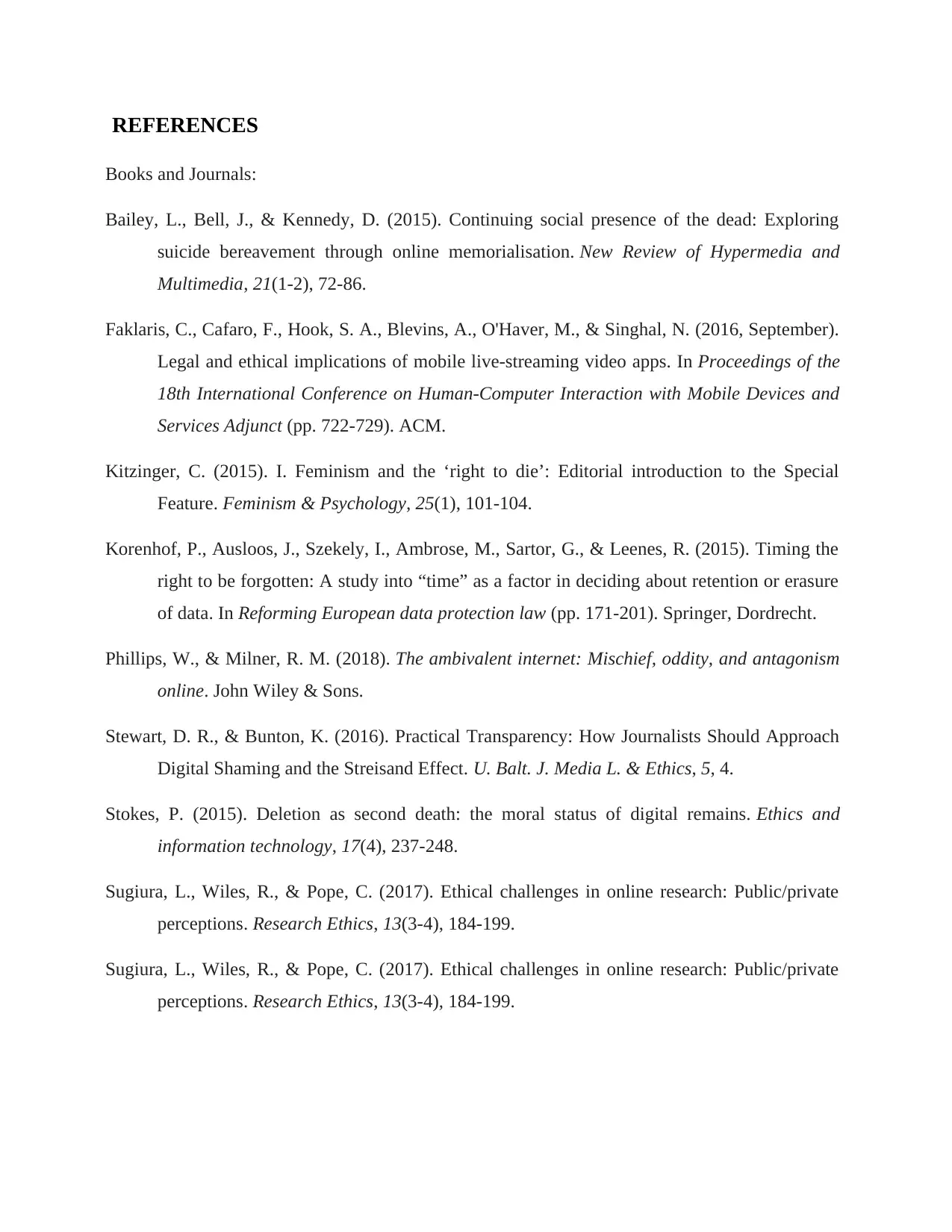
REFERENCES
Books and Journals:
Bailey, L., Bell, J., & Kennedy, D. (2015). Continuing social presence of the dead: Exploring
suicide bereavement through online memorialisation. New Review of Hypermedia and
Multimedia, 21(1-2), 72-86.
Faklaris, C., Cafaro, F., Hook, S. A., Blevins, A., O'Haver, M., & Singhal, N. (2016, September).
Legal and ethical implications of mobile live-streaming video apps. In Proceedings of the
18th International Conference on Human-Computer Interaction with Mobile Devices and
Services Adjunct (pp. 722-729). ACM.
Kitzinger, C. (2015). I. Feminism and the ‘right to die’: Editorial introduction to the Special
Feature. Feminism & Psychology, 25(1), 101-104.
Korenhof, P., Ausloos, J., Szekely, I., Ambrose, M., Sartor, G., & Leenes, R. (2015). Timing the
right to be forgotten: A study into “time” as a factor in deciding about retention or erasure
of data. In Reforming European data protection law (pp. 171-201). Springer, Dordrecht.
Phillips, W., & Milner, R. M. (2018). The ambivalent internet: Mischief, oddity, and antagonism
online. John Wiley & Sons.
Stewart, D. R., & Bunton, K. (2016). Practical Transparency: How Journalists Should Approach
Digital Shaming and the Streisand Effect. U. Balt. J. Media L. & Ethics, 5, 4.
Stokes, P. (2015). Deletion as second death: the moral status of digital remains. Ethics and
information technology, 17(4), 237-248.
Sugiura, L., Wiles, R., & Pope, C. (2017). Ethical challenges in online research: Public/private
perceptions. Research Ethics, 13(3-4), 184-199.
Sugiura, L., Wiles, R., & Pope, C. (2017). Ethical challenges in online research: Public/private
perceptions. Research Ethics, 13(3-4), 184-199.
Books and Journals:
Bailey, L., Bell, J., & Kennedy, D. (2015). Continuing social presence of the dead: Exploring
suicide bereavement through online memorialisation. New Review of Hypermedia and
Multimedia, 21(1-2), 72-86.
Faklaris, C., Cafaro, F., Hook, S. A., Blevins, A., O'Haver, M., & Singhal, N. (2016, September).
Legal and ethical implications of mobile live-streaming video apps. In Proceedings of the
18th International Conference on Human-Computer Interaction with Mobile Devices and
Services Adjunct (pp. 722-729). ACM.
Kitzinger, C. (2015). I. Feminism and the ‘right to die’: Editorial introduction to the Special
Feature. Feminism & Psychology, 25(1), 101-104.
Korenhof, P., Ausloos, J., Szekely, I., Ambrose, M., Sartor, G., & Leenes, R. (2015). Timing the
right to be forgotten: A study into “time” as a factor in deciding about retention or erasure
of data. In Reforming European data protection law (pp. 171-201). Springer, Dordrecht.
Phillips, W., & Milner, R. M. (2018). The ambivalent internet: Mischief, oddity, and antagonism
online. John Wiley & Sons.
Stewart, D. R., & Bunton, K. (2016). Practical Transparency: How Journalists Should Approach
Digital Shaming and the Streisand Effect. U. Balt. J. Media L. & Ethics, 5, 4.
Stokes, P. (2015). Deletion as second death: the moral status of digital remains. Ethics and
information technology, 17(4), 237-248.
Sugiura, L., Wiles, R., & Pope, C. (2017). Ethical challenges in online research: Public/private
perceptions. Research Ethics, 13(3-4), 184-199.
Sugiura, L., Wiles, R., & Pope, C. (2017). Ethical challenges in online research: Public/private
perceptions. Research Ethics, 13(3-4), 184-199.
Paraphrase This Document
Need a fresh take? Get an instant paraphrase of this document with our AI Paraphraser

Young, A., Froggatt, K., & Brearley, S. G. (2017). ‘Powerlessness’ or ‘doing the right thing’–
Moral distress among nursing home staff caring for residents at the end of life: An
interpretive descriptive study. Palliative medicine, 31(9), 853-860.
Moral distress among nursing home staff caring for residents at the end of life: An
interpretive descriptive study. Palliative medicine, 31(9), 853-860.
1 out of 8
Related Documents
Your All-in-One AI-Powered Toolkit for Academic Success.
+13062052269
info@desklib.com
Available 24*7 on WhatsApp / Email
![[object Object]](/_next/static/media/star-bottom.7253800d.svg)
Unlock your academic potential
Copyright © 2020–2026 A2Z Services. All Rights Reserved. Developed and managed by ZUCOL.




